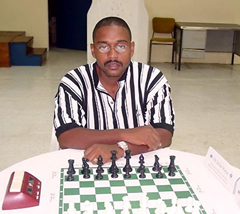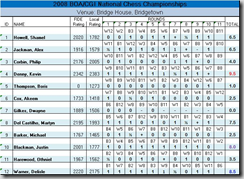A Book Every Chess Players & Business People Must Have!! While there's nothing much to do during the month of Ramadhan, I was listening to this audiobook. It also changes my game plan & preparation.
I recommend to one of my friends who was doing business. After listening to it, to his amazement he found out new ways on how to expand his businesses thank to this book. He's not a chess player but by taking the ideas behind which is decision making & insightful. He'd made the correct choice. CHECKMATE!!!

Garry Kasparov – How Life Imitates Chess
Editorial Reviews
Amazon.com Review
In his 22-year reign as Grandmaster, Garry Kasparov faced more than a few tough choices under the heat of chess competitons. This is a man who knows a thing or two about making smart decisions, and since his retirement in 2005, Kasparov has put his powerful strategic thinking to work in business and politics, showing that a simple reliance on instincts can guide you through even the most complex challenges. With no shortage of wit or eloquence, he's answered our hardest questions about what factors can make or break a decision-making moment. --Anne Bartholomew
By S. Isom (Review from amazon.com)
I picked this up after being impressed by Kasparov on "Sixty Minutes" a few weeks ago. I wonder if those "publishers weekly" people actually read the book! This isn't really a business book, it's a thinking book. I'm not a chess player but those were the most interesting sections of the book, in that I agree. It's unfair to take out a few inevitable platitudes and ignore the other 95% of the book. There are dozens of business examples, although they aren't explored in depth. But the book isn't case studies. It's about the process of making decisions and finding a way to improve that method in ANY situation. Read the Table of Contents above, which is more than the PW reviewer probably did!
(My favorite sections were "Man vs Machine" on his games against computers and a great story about being beaten at a video game by a little kid. And the "Attacker" sections about taking the initiative.)
This isn't a book of simple tips you can take to work tomorrow if that's what you are looking for. It is full of stories and insights about thinking and peak performance. Kasparov is a chess player, politician, and obviously a history buff, so naturally most of his examples come from those worlds.
(Which are more interesting than most business stories anyway.) In fact, that's exactly what he says at the start, where he says it's up to each person to develop a "personal map". He doesn't pretend to be a businessman or try to make many direct comparisons to chess and business. He learned from chess and explains how.
I found a lot of it useful because it makes you aware of how lazy most of us are when it comes to things like being impulsive, or over-cautious, and unprepared even for important moments. I'm not in the "boardroom" but I've owned my own business and I'm interested in using these ideas. Not with Kasparov's over-the-top rigor maybe, but you don't have to want to be a world champion to learn from one.
For sample of other reviews,
click here.
Questions for Garry Kasparov
Amazon.com: Why do you think decisiveness is such an elusive skill for people to master? Are there simply too many choices? What’s a good first step for negotiating your options?
 Kasparov: It’s true that today we are faced with greater complexity in almost every aspect of our lives, from global competition in the business world to more options for entertainment. The connected world has flooded us with a limitless supply of data, and equally limitless choices. One of the problems this has created is that it creates the illusion, or delusion, that we can achieve perfection in our decisions by accumulating more information. It’s too easy to blame faulty decisions on imperfect information, but information is always limited in some way, as is the time available to make our decisions. Forget perfection! Decisiveness comes from the courage to trust your instincts. The more you trust, the more you’ll build up that intuition and the more accurate it will become, creating a positive cycle.
Kasparov: It’s true that today we are faced with greater complexity in almost every aspect of our lives, from global competition in the business world to more options for entertainment. The connected world has flooded us with a limitless supply of data, and equally limitless choices. One of the problems this has created is that it creates the illusion, or delusion, that we can achieve perfection in our decisions by accumulating more information. It’s too easy to blame faulty decisions on imperfect information, but information is always limited in some way, as is the time available to make our decisions. Forget perfection! Decisiveness comes from the courage to trust your instincts. The more you trust, the more you’ll build up that intuition and the more accurate it will become, creating a positive cycle.
Before you lay out your options, what we might call considering your next move, you have to have a solid understanding of the present. Evaluation is more important than calculation. Rushing into narrowing things down to a list of options is itself a form of making a choice -- and if you do that, you can prematurely rule out important possibilities. Stop looking ahead for a moment and examine the current state of affairs. Good decisions come from a solid understanding of all the factors that come into play. Once you have tuned your evaluation skills and learned to put the options on hold for a moment you’ll often find that difficult decisions become obvious.
Amazon.com: Taking a holistic view of your career, do you recall the moment you identified your talent for thinking strategically? Is it possible for you to separate that sense of yourself from your identity as a chess champion?
Kasparov: In the world of competitive chess, or any sport for that matter, everything is relative. Your results tell you about your talent. How can you identify a talent that goes untested? That’s one reason I’m so passionate about trying new things and about encouraging others to leave their comfort zones. I was fortunate in that my status as world champion brought me into contact with world leaders, top executives, authors, and other luminaries. I very much enjoyed these exchanges, learning about these other worlds. It also gave me the chance to share my own thoughts, something I’ve never been shy about doing. I’m sure they had to humor my impetuousness on occasion! But often they encouraged me and I discovered I had a knack for making unusual connections, a way of seeing the big picture that wasn’t limited to the chessboard.
Until my retirement from chess in March 2005 it would have been nearly impossible for me to separate myself from my chess identity--other than love for family and friends. But since then I have moved into several entirely different worlds. I’m at the table as a politician, or writing editorials, or lecturing about strategy and intuition in front of business audiences. My former chess career still precedes me in these settings, but they aren’t humoring me anymore! Actually, the biggest step was working on this book, which forced me to consider the mechanics of my own mind beyond chess. I had to ask myself if I really had something to offer and then figure out how to express it concretely. The positive reactions of my lecture audiences also helped in this regard.
Amazon.com: Playing chess competitively no doubt requires huge reserves of passion, patience, and discipline. For those readers who haven’t experienced the kind of rigorous training that competitive chess imparts, can you recommend some good ways to practice strategic thinking?
Kasparov: We all do it every day, the difference is that it takes discipline to become aware of it. In the book I ask the reader to consider all the significant decisions they made that day, that week. You don’t have to be a chess player or an executive to benefit from improving your decision- making process. We make hundreds of decisions just to get through each day. A handful are important enough to keep track of, to look back on critically. Were they successful? Why or why not? We can train ourselves, which is really the only way.
Amazon.com: Did you ever find during a particularly difficult match that it was hard to prevent your emotions from clouding your decision-making ability? What was your strategy for coping with stress or anxiety in that kind of situation?
Kasparov: Emotion is a critical element of decision-making, not a sin always to be avoided. As with anything it is harmful in excess. You learn to focus it and control it the best you can. I’m a very emotional person in and out of chess so this was always a challenge for me. When I sat down at the board against my great rival, Anatoly Karpov, it was a special occasion. I knew it, he knew it, and we both knew the chess world was paying special attention. We had such a long and bitter history that it was impossible not to bring it to the board with us every time we played.
On some occasions this anxiety created negative emotions like doubt. More often it generated greater creative tension, greater supplies of nervous tension, which is a chess player’s lifeblood.
Usually when you are under stress there is a good reason for it. Learning not to get anxious about things beyond your control is a separate issue. So don’t fight stress, use it! Channel that nervous energy into solving the problems. Sitting around worrying isn’t going to achieve anything and the loss of time will often make the problem worse. Even in the worst case, mistakes of action teach you much more than inaction. Forward!
Amazon.com: If you could choose five people, living or dead, to play you in chess, who would they be?
Kasparov: Don’t you know I have retired as a chess player? Well, I will go with you to the middle with two and a half opponents.
4th world chess champion Alexander Alekhine (d. 1946) was my childhood chess idol. The book of his collected games was my constant companion. He was a player of limitless imagination and combativeness. Some aspects of his pre-WWII-era chess would be considered antique today, but his talent is timeless. Just sitting at the board with him to analyze and share ideas would be like a youthful dream made real.
My next player requires a change of date as well, since I am now retired. In the period of 2001-2002 I felt I deserved a rematch against Vladimir Kramnik, who took my title in 2000. I was still the top-rated player in the world, the obvious top challenger. So I would choose a 16-game match against Kramnik--in 2002.
Last on my list is a chessplayer who is most definitely dead. Even if chess has by now passed it by, I would take a tiebreaker match against Deep Blue. I won our first match; the machine won the second. Then IBM made sure there would be no chance for a rematch. This time everything would be out in the open, no black boxes. Of course chess machines are considerably stronger today. It would still be pleasant to gain revenge and set the record straight.
CONTENTS
Opening Gambit
The secret of success
Why chess?
A map of the mind
Better decision-making cannot be taught, but it can be self-taught
Part 1
Chapter 1 – The Lesson
Personal lessons from the World Champion
Becoming aware of the process
Chapter 2 – Strategy
Success at any speed
“Why?” turns tacticians into strategists
An ever-expanding example
Play your own game
You cannot always determine the battlefield
A frequently changed strategy is the same as no strategy
Don’t watch the competition more than you watch yourself
Once you have a strategy, employing it is a matter of desire
Chapter 3 - Strategy and Tactics at Work
Element of surprise
A genius for development
Sticking with a plan
Confidence and the time factor
Never give in – never, never, never
Chapter 4 – Calculation
Calculation must be focused and disciplined
Imagination, calculation, and my greatest game
Chapter 5 – Talent
Recognizing the patterns in our lives
The power of fantasy
Fantasy can cut through fog
Developing the habit of imagination
Be aware of your routines, then break them
Chapter 6 – Preparation
Results are what matter
Inspiration versus perspiration
Preparation pays off in many ways
Turning a game into a science
Targeting ourselves for efficiency
Part II
Chapter 7 – M-T-Q: Material, Time, Quality
Evaluation trumps calculation
Material, the fundamental element
Time is money
When time matters most
The third factor: Quality
What makes a bad bishop bad?
Putting the elements into action
Double-edged evaluation
Personal return on investment
MTQ on the home front
Chapter 8 – Exchanges and Imbalances
Freezing the game
The search for compensation
The laws of thermodynamics, chess, and quality of life
Strategy on the browser battlefield
All changes comes with a cost
Overextending our reach
Chapter 9 – Phases of the Game
Know why we make each move we make
Improving the product
Art is born from creative conflict
Make sure a good peace follows a good war
Eliminating phase bias
Don’t bring a knife to a gunfight
Chapter 10 – Attacker’s Advantage
The aggression double-standard
The initiative rarely rings twice
An attacker by choice
The transition from imitator to innovator
The will to attack
Part III
Chapter 11 – Question Success
The gravity of past success
Competition and anti-complacency tactics
In favor of contradiction
The difference between better and different
Chapter 12 – The Inner Game
The game can be won before you get to the board
The storm before the calm
Don’t get distracted while trying to distract
Breaking the spell of pressure
Staying objective when the chips are down
Pretenders to the crown and fatal flaws
Chapter 13 – Man vs. Machine
Enter the machines
And a child shall lead us
Kasparov V. Deep Blue
If you can’t beat’em, join’em
Staying out of the comfort zone
Chapter 14 – Intuition
We know more than we understand
Intuition versus analysis
How long is long enough?
The perils of ignoring a trend
Chapter 15 – Crisis Point
One single moment
Detecting a crisis before it’s a crisis
Learning from a crisis
A final chess case study: The Crisis in Seville
Must-win strategy
Errors on both sides
Keeping a grip on the title







 Kasparov: It’s true that today we are faced with greater complexity in almost every aspect of our lives, from global competition in the business world to more options for entertainment. The connected world has flooded us with a limitless supply of data, and equally limitless choices. One of the problems this has created is that it creates the illusion, or delusion, that we can achieve perfection in our decisions by accumulating more information. It’s too easy to blame faulty decisions on imperfect information, but information is always limited in some way, as is the time available to make our decisions. Forget perfection! Decisiveness comes from the courage to trust your instincts. The more you trust, the more you’ll build up that intuition and the more accurate it will become, creating a positive cycle.
Kasparov: It’s true that today we are faced with greater complexity in almost every aspect of our lives, from global competition in the business world to more options for entertainment. The connected world has flooded us with a limitless supply of data, and equally limitless choices. One of the problems this has created is that it creates the illusion, or delusion, that we can achieve perfection in our decisions by accumulating more information. It’s too easy to blame faulty decisions on imperfect information, but information is always limited in some way, as is the time available to make our decisions. Forget perfection! Decisiveness comes from the courage to trust your instincts. The more you trust, the more you’ll build up that intuition and the more accurate it will become, creating a positive cycle.
